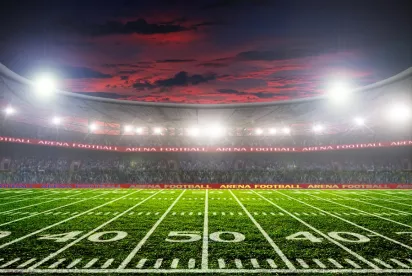First, Deflategate. Now, “Ticket-gate?” Stirring in the United States District Court, Northern District of Ohio, a putative class action takes aim at an unsafe football field, a cancelled preseason game, and over a million dollars in alleged consumer class damages. The case is Herrick v. National Football League, et al. (N.D. Ohio, Case No. 5:17-cv-00472-CAB).
The Allegations
The 2016 Pro Football Hall of Fame preseason game between the Green Bay Packers and Indianapolis Colts was scheduled to take place on August 7, 2016. But due to compromised painting of logos and other markings on the turf, the field was deemed unsafe and unplayable. That call, and the related call to scrap the game entirely, was made, according to filings in the case, at 5:00 p.m. on the day of the game. Fans attending the game, however, were allegedly intentionally kept in the dark and were not informed of the game’s cancellation until three hours later. In the meantime, fans purportedly were ushered into the stadium and encouraged to buy food, drinks, and merchandise. Plaintiff, on behalf of himself and “thousands” of putative class members, now seeks to recover not only the cost of the tickets, but also related out-of-pocket incidentals, such as travel and lodging expenses.
Class Certification
On January 15, 2018, Plaintiff moved for class certification. As framed in the motion, the question of liability on the sole claim for breach of contract might not be the main hurdle; rather, the central issue will be whether the class can proceed as a damages class under Federal Rule of Civil Procedure 23(b)(3). Under the U.S. Supreme Court’s decision in Comcast Corp. v. Behrend, 569 U.S. 27 (2013), to proceed as a damages class under Rule 23(b)(3), while a plaintiff’s class damages model may be an approximation, it still must be firmly tethered to the theory of injury. Id. at 35.
So how does Plaintiff’s damages model purport to do so? According to Plaintiff’s expert, Dr. Justine Hastings, it’s all in available records. Ticket damages? According to Dr. Hastings, Defendant’s revenue data and secondary market statistics can approximate ticket costs. Traveling expenses? According to Dr. Hastings, ticket holders’ zip codes can predict the likely mode of travel and associated travel costs for individuals. And lodging expenses? According to Dr. Hastings, ticket holders’ zip codes and the average hotel rate in the area ($289/night) can be used to quantify lodging expenses.
Will this suffice to secure certification of a damages class under Rule 23(b)(3)? Stay tuned. Opposition papers are due February 16, and oral argument is set for March 26. In the meantime, here’s to hoping for a class action-free Super Bowl LII.




 />i
/>i

